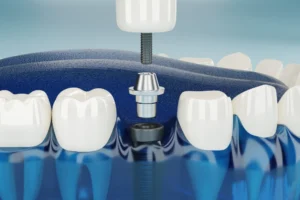When you lose a tooth, it affects more than your smile. This influences your confidence, chewing ability and even your facial structure. But good news? Dental implants provide a lasting solution. They are like real teeth, in terms of look, feel, and function. That’s why they’re often called the best fix for missing teeth.
What Are Dental Implants?
Think of a dental implant as a high-tech replacement tooth. It’s not just fake teeth that sit over the gums. It is actually connected to your jawbone like the root of a natural tooth.
What Makes an Implant Different from a Denture or Bridge?
Unlike dentures that can shift or cause discomfort, or bridges that depend on adjacent teeth for support, dental implants are the best choice for missing teeth as they are firmly fixed in your jawbone. Consequently, they are very safe and durable.
Main Parts of an Implant – Root, Abutment & Crown
- Root – A small titanium screw placed into your jawbone.
- Abutment – A connector that sits on top of the root.
- Crown – The visible tooth part that looks just like your natural tooth.
Together, these parts work in balance to offer the best dental treatment for missing teeth.
How Implants Mimic Real Teeth (Function + Appearance)
You can bite, chew, smile, and speak just like you would with your natural teeth. That’s why dental implants are the best choice for missing teeth. They act like real teeth in every way.
Common Reasons People Lose Teeth
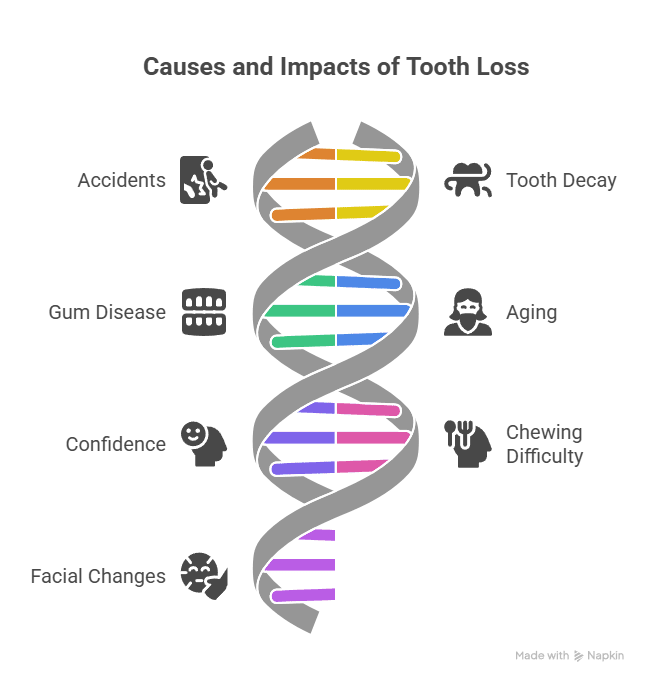
Accidents, Tooth Decay, Gum Disease, and Aging
Tooth loss can occur for many reasons, and it is more common than most people realise. For a moment, you are enjoying biting your favourite snacks, and next time, a sticky or torn tooth makes everything difficult. Here are some of the most common causes:
- Accidents or trauma – A fall, sports injury, or a simple misfortune can knock out a tooth instantly.
- Tooth decay – If cavities are left untreated, they can destroy the structure of your tooth from the inside out.
- Gum disease – When gums get infected, they weaken the foundation of your teeth, making them loose or even causing them to fall out.
- Aging – As we grow older, natural wear and tear, along with past dental issues, can lead to tooth loss.
Regardless of the situation, a lost tooth goes beyond a smile. It is a loss that most people do not want to experience. Therefore, finding the best fix for missing teeth is really important. It will not only maintain our daily comfort and health but also keep our appearance intact.
Impact on Confidence, Chewing, and Facial Structure
When you lose a tooth, it doesn’t just leave a gap in your mouth—it can affect your entire lifestyle:
- Confidence takes a hit – Smiling in photos or talking with others might make you feel self-conscious.
- Chewing becomes difficult – Hard or chewy foods become a challenge, or even painful.
- Facial shape changes – Without teeth to support your jawbone, your face can start to sag or look sunken over time.
All these effects can lead to bigger issues in the long run. That’s why many dentists recommend dental implants as the best choice for missing teeth. Not only do they replace missing teeth, but they also help restore your normal way of life—smiling, eating, and speaking without worry.
Why Dental Implants Are the Best Long-Term Choice
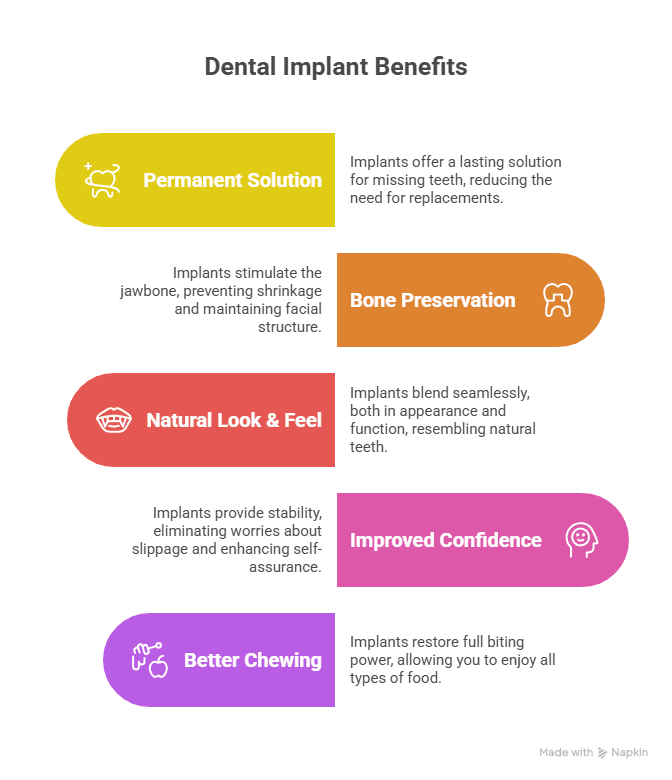
Permanent & Durable – Can Last a Lifetime with Care
Implants are designed to be strong and stable. With good brushing, flossing, and regular dentist visits, they can last 15–25 years or sometimes even longer. A permanent solution for missing teeth means less worry and fewer replacements.
Bone Preservation – Protects Jawbone and Facial Shape
When you lose a tooth, the jawbone can begin to shrink. However, implants stimulate the bone, just like real teeth. It helps your face look young and natural.
Natural Look & Feel – Like Real Teeth in Appearance and Function
From how they look to how they feel when you chew or talk, implants blend right in. Most people won’t even notice you have one.
Improved Confidence – No Slipping, No Embarrassment
Forget the concern of falling or changing dentures during dinner. The implants stay in place, making you smile and laugh freely.
Better Chewing Ability – Eat What You Love Without Worry
Crunchy apples? Chewy steak? No problem. Implants are the best fix for missing teeth because they restore full biting power.
Dental Implants vs Other Tooth Replacement Options
Comparison: Implants vs Dentures
Let’s see how implants compare to other options like dentures:
| Feature | Dental Implants | Dentures |
| Longevity | Typically lasts 15–25+ years or even a lifetime with proper care. Truly a permanent solution for missing teeth. | Usually needs to be replaced every 5–7 years due to wear or changes in mouth structure. |
| Comfort | Feels and functions like natural teeth. No slipping, no discomfort. It’s often the best fix for missing teeth. | May cause soreness or move around while talking or eating. Can feel bulky or unnatural. |
| Maintenance | To keep it clean and healthy is really easy – just do it like you normally would with your teeth, brushing and flossing. It is a long-term, low-maintenance choice. | Needs daily removal, soaking, cleaning, and sometimes adhesive. It can be a messy and tedious routine. |
| Preserves Jawbone | Yes. Helps stimulate the jawbone, preventing bone loss and maintaining facial shape. A key reason why dental implants are the best choice for missing teeth. | No. Dentures are placed on the gums and do not provide any support to the jawbone, which causes the jawbone to shrink and sag with time. |
| Appearance | Designed to look just like natural teeth—colour, shape, and shine. People often can’t tell they’re implants. | It can look artificial or bulky, especially over time. May change appearance if not properly fitted. |
This makes it clear why dental implants are the best choice for missing teeth. They win in every category that matters.
Why Implants Are the Long-Term Winner
- Dental implants provide a lasting solution, unlike bridges or dentures. Those need replacing more often.
- They helps to maintain your jawbone and facial shape.
- They’re more cost-effective over time, even if the upfront cost is higher.
- Most importantly, they help you replace missing teeth most naturally and confidently possible.
The Dental Implant Procedure – Step-by-Step
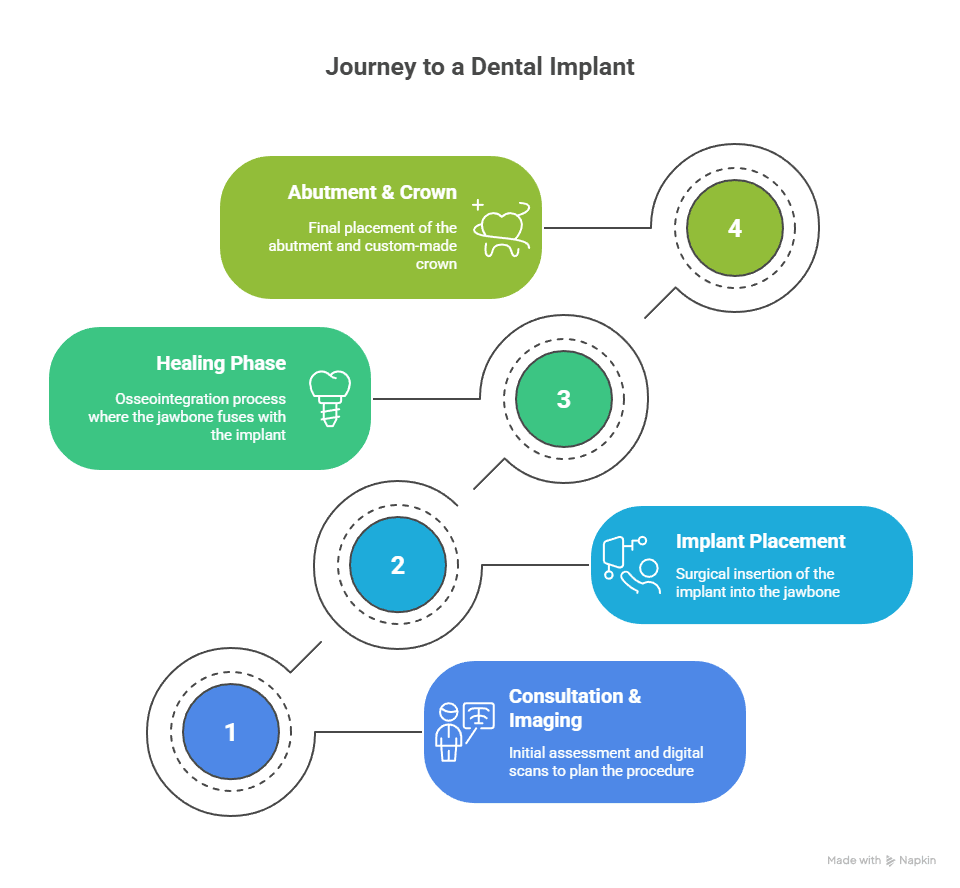
Getting a dental implant may seem complex, but it is actually a smooth and well-planned process. Let’s divide it into simple, clear stages so you know what to do.
Step 1: Consultation and Digital Imaging
The first step is consultation. The dentist checks your overall oral health and explore whether implants are a suitable option for you. They’ll use digital X-rays or 3D scans to to have an accurate picture of the jawbone, gums, and teeth that are still there. This is a step towards making a personalized plan of treatment that will suit your teeth.
Step 2: Implant Placement Surgery
Now comes the big moment the actual implant placement. This is a minor surgical procedure done under local anaesthesia (you’ll be awake, but you won’t feel pain).
Step 3: Healing Phase (Osseointegration)
This stage requires a lot of patience. The recovery time, known as osseointegration, can be between 3 to 6 months. your jawbone grows around the implant, giving it a natural stronghold.
Step 4: Abutment Crown Placement
Once your implant has healed, the final touches are added. First, a small connector piece called an abutment is attached to the implant. Then, a custom-made crown (that looks just like your real tooth) is placed on top.
Key Benefits of Choosing Dental Implants
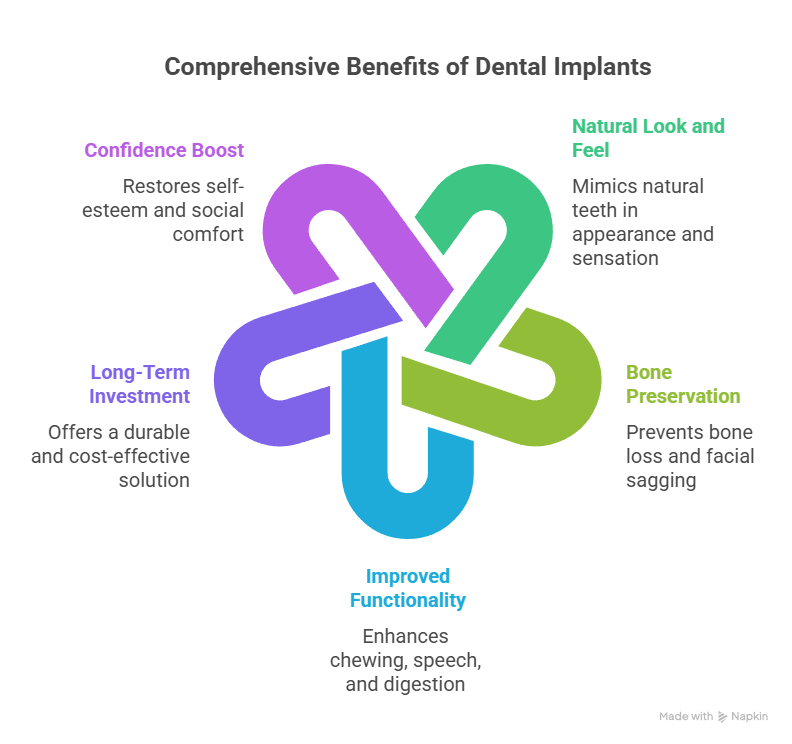
Don’t you think that so many people choose dental implants? The answer is simple because they’re one of the best ways to bring back your smile, both in looks and in function. Here’s why they stand out:
Look, Feel, and Function Like Natural Teeth
Dental implants are designed to mimic your real teeth. The crown on top is custom-made to match your natural teeth in color and shape.
When you talk, smile, or chew, no one will even know it’s not your original tooth!
Prevent Bone Loss and Facial Sagging
When you lose a tooth, the bones in your jaw will start to diminish gradually. This makes your facial features appear sunken and aged. Dental implants help preserve your jawbone, which will ultimately keep your face from losing volume and still have a natural look.
Unlike dentures, implants stimulate your bone, just like natural teeth.
Improve Chewing, Speech, and Digestion
With dentures, food can feel tricky. But dental implants let you chew properly again, which helps with digestion. No more avoiding hard or chewy foods!
Plus, they improve your speech clarity, since there’s no slipping or clicking like with loose dentures.
Long-Lasting Investment
Transplantation can last 15-25 years or more with good care. This is a great win compared to bridges or dentures, which often have to be replaced with a few years.
It’s not just a fix, it’s a long-term solution that saves you time and money down the line.
Boost Confidence and Quality of Life
Missing teeth can make people shy to smile or eat in public. Implants not only bring back your beautiful smile but also return your lost confidence. You will be at ease when taking photos, attending meetings, daily life
Your Dental Implant Journey Timeline
Wondering how long it takes from start to finish? Here’s a simple timeline to show the general process of getting dental implants:
Are You a Good Candidate for Dental Implants?
Most healthy adults are eligible, but there are some things that your dentists will see before starting the treatment.
Healthy Gums and Overall Wellness
You need healthy gums and no big, untreated infections in your mouth. Also, your overall health plays a role. If you have heart disease or autoimmune disorders, you might need extra planning.
Adequate Jawbone Strength or Need for Bone Graft
If your jawbone is strong, you’re good to go. If not, you might need a bone graft first. This helps support the implant so it doesn’t loosen later.
Don’t worry—bone grafts are a common and safe step in the implant process.
Considerations: Smoking, Diabetes, Age
- Smoking can slow healing, so quitting (even short-term) is important.
- Diabetes should be well-controlled for successful healing.
- Age isn’t a limit! Many seniors successfully get implants—your health matters more than your age.
What Do Dental Implants Cost?
Yes, dental implants can seem pricey up front. But for the long run, they’re worth every bit. Let’s break it down.
Breakdown – Consultation, Surgery, Crown
Here’s what typically goes into the cost:
- Initial consultation & imaging
- Surgery to place the implant
- The abutment and custom crown
- Any extras like bone grafting or sedation (if needed)
In India, a single implant can range between ₹30,000 and ₹60,000+, it varies depending on the clinic and materials used.
Why It’s a Smart Long-Term Investment
While dentures or bridges may cost less at first, they often need repairs or replacements. Implants, on the other hand, last decades with proper care.
Over time, dental implants actually save you money—and protect your jawbone too!
Financing & Insurance Tips
- Some dental clinics offer EMI or financing plans.
- If you have dental insurance, check if implants are partially covered
- Health cards or wellness plans can helps reduce costs sometimes.
Always ask your dentist for a detailed quote and payment options before starting.
How to Take Care of Your Dental Implants
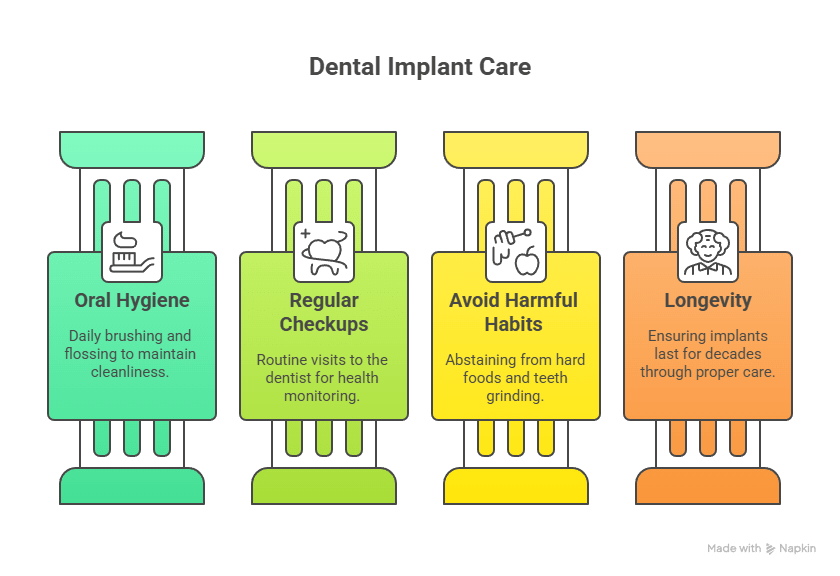
Brushing, Flossing, and Oral Hygiene
Treat them like real teeth. Use a soft toothbrush and floss daily.
Routine Dental Visits
Regular checkups help keep the implant and surrounding gums healthy.
Avoid Hard Foods, Smoking, Teeth Grinding
Habits such as chewing ice or grinding teeth can damage implant or crown.
Longevity with Proper Care
With good hygiene, implants can last 25+ years—some even for life!
Real Stories – How Implants Changed Smiles
Patient Experiences: Comfort, Aesthetics, Confidence
“I used to hide my smile. Now I can’t stop grinning.”
“Chewing steak used to be a challenge. Now, I don’t even think about it.”
Quotes or Mini Testimonials
“Getting implants changed my life. I finally feel like myself again.”
“They look exactly like my old teeth—but better!”
FAQs About Dental Implants
Do Dental Implants Hurt?
Not during the procedure. We use local anaesthesia and post-surgery discomfort is usually very low.
How Long Do Implants Last?
With proper care, dental implants provide a lasting solution that can last decades or a lifetime.
What If I’m Missing Multiple Teeth?
No problem! Implants can support bridges or full-arch dentures, too.
Is the Procedure Safe?
Yes, especially when performed by experienced professionals with proper imaging and planning.
What’s the Recovery Time?
Initial healing takes 1–2 weeks, but full bonding to the bone (osseointegration) takes a few months.
Final Thoughts
For the best dental treatment for missing teeth, a certain solution stands out undoubtedly. Dental implants are the best solution for missing teeth as they are the strongest, most natural-looking, and most durable. Whether you have lost a single tooth or several, the best thing you can do for your smile, your health, and your self-confidence is to have implants installed.
So don’t settle for temporary fixes. Choose the best choice for missing teeth—choose implants.




